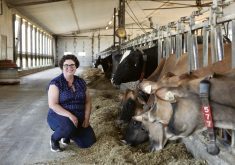One drawback to living on a farm is that unless the farm is within easy driving distance of a major centre — and most aren’t — it can be tough to access post-secondary education and farm at the same time.
Over the last few decades, however, the internet has changed everything by bringing educational programs right into the farmhouse through online distance-learning programs.
The list is growing, and now most institutions offer ag-related programs digitally.
Read Also

Five reasons why you avoid farm bookkeeping
Bookkeeping for the farm business might not be anyone’s favourite chore, but staying on top of it can help your farm access the funds it needs to grow.
How you fit these programs into your personal schedule depends on how the college or university has structured them. Some require students to be online at specified times to attend a virtual lecture. Often it’s because they feel student participation adds a lot of value, and also that it’s good for the students to get to know each other, but don’t forget that courses may also require you to attend “labs” on a couple of days when there’s a more hands-on approach.
By contrast, farmers can also look for programs that are less restrictive. You can listen to the lectures and do the work as your time permits. Similarly, they may let you start and finish the course whenever works best for you.
But which course will produce the best net benefit for the farm? It can take some serious research.
For those interested in advancing their education with a specific agriculture-related course, certificate or degree program, we’ve put together a list of some of the major online learning opportunities. Google will help you find others.
Let’s start with a word to the wise though. Be prepared to dig into the programs. Consult your personal network for their advice and experience, and check social media. Below, we list just some of the opportunities by province, but do sort out whether the school’s location is likely to make a difference in achieving your goals.
British Columbia
In B.C., none of the major institutions offer dedicated ag programs online. However, check out Royal Roads University at Victoria for its highly regarded leadership training. As well, Simon Fraser University in Burnaby (sfu.ca), Douglas College in New Westminster (douglascollege.ca) and Thompson Rivers University (tru.ca) with campuses in Kamloops and Williams Lake, offer many business-related courses, as well as programs in other disciplines. As farms get more complex, business courses on topics including financing, marketing and HR management can relate to the farm as much as any other enterprise.
Alberta
In Alberta, Olds College offers a wide range of online agriculture courses through its continuing education program. Topics include agribusiness, agronomy, beef production, direct marketing and equine courses.
Course listings can be found at the Olds College Continuing Education page.
Many Alberta colleges offer online courses in those other more generic business disciplines.
The University of Alberta has now opened some courses that it describes as “highly engaging and rigorous versions” of Massive Open Online Courses (MOOCs) to the general public. These are the real deal, i.e. courses that can be taken for credit by U of A students enrolled in a particular degree or certificate program at that institution and potentially as transferable credits toward programs in other institutions.
The list of programs can be found at www.ualberta.ca/admissions-programs/online-courses/index.html.
The university’s extension department offers several online courses in business and other disciplines. Course descriptions and listings can be found at ext.ualberta.ca.
The University of Calgary also offers an extensive list of online courses in business as well as computer science. You’ll find those courses listed at conted.ucalgary.ca/programs/.
Alberta’s two technical colleges, NAIT and SAIT, list a number of specific courses useful to producers. Some are available only online, while others are “blended.” Check nait.ca and sait.ca for details.
Saskatchewan
The University of Saskatchewan’s, College of Agriculture offers a “micro-credentials” program online that targets a narrowly focused knowledge set. These courses are aimed at developing specific skills in fields including ag and business. Each course requires between 50 and 150 hours of learning.
A list of these programs can be found at continuing.usask.ca.
The Saskatchewan Polytechnic college offers a wide range of online courses in several disciplines including business and management. It also offers some specific ag certification training courses. Some supply print materials for study, and final exams are online, such as for commercial seed treatment application.
You’ll find SP’s online course offerings at the Sask Polytech website.
Although none of the University of Regina’s digital programs are ag specific, it does offer an extensive list of online learning opportunities that are worth checking out.
Manitoba
Manitoba’s Assiniboine Community College’s agriculture extension branch offers online workshops, including commercial manure application, manure management and pesticide certification.
It also offers several other related online programs including a management certificate, which has no live or real-time requirements, so students can work when their schedule permits.
Find out more at the Online Programs page at the ACC website.
Manitoba’s Red River College doesn’t offer any dedicated agriculture programs but it does have a number of general business, marketing, accounting and HR management courses available online.
For a list of courses and details, visit the RRC website.
The University of Winnipeg offers part-time programs that can be completed online. While there are no specific ag-related programs offered, like most other institutions it offers courses in management and HR. Visit the University of Winnipeg website for more information.
Eastern Canada
The Ontario Agriculture College at the University of Guelph offers an impressive slate of online learning opportunities, both in business and in agriculture. Course listings are at uoguelph.ca/oac/.
Boreal College offers online courses in agriculture, including veterinary technician courses; however, they are available only in French
Dalhousie University’s faculty of agriculture in Nova Scotia offers several specific skills courses through the continuing education department. Some, however, require attending labs or classes on some days.
Is online your best choice?
Most higher-learning institutions have been steadily expanding their digital course offerings for at least a decade. The reason is simple: it’s a convenient way to learn, especially for those whose job or location makes attending regularly scheduled in-person classes impossible. This makes digital courses ideal for rural producers who want to upgrade their education — and profitable for the school.
“The majority of our distance education students are employed full-time,” says Rae-Ann Thibeault, dean of Red River College’s School of Continuing and Distance Education. “Distance education gives them the flexibility.
“Online learning has continued to grow,” Thibeault adds. “The number of digital offerings from many institutions saw a significant boost due to the Covid-19 pandemic. Many colleges transferred several courses to an online format to cope with public health restrictions and to keep students and staff safe while permitting learning to continue.
Tips for learning online
For those who are considering enrolling in an online program or even a single course, the University of Manitoba has published a list of tips to help improve your odds of success:
- First, find out whether your laptop is up to the job. Take a close look at the minimum hardware and software standards you’ll need to meet, and do it on a course-by-course basis. They can vary even when the courses are all taught by the same faculty or institution. While many courses may only require some basic word processing, and page and video viewing capability, others may demand much more. Also be sure you’ve got the bandwidth and you can handle the data transfer speeds needed during the course.
- Also consider your own processing speed. Taking courses from home doesn’t come naturally to everyone. If you’re a mature student and it’s been a while since you’ve attended classes, it can take some getting used to. You’ll also need time management skills and self-discipline to get assignments completed on time. Even for those fresh out of school but not used to at-home learning, it will be a new experience. It’s easy to fall behind. To stay on track, the U of M suggests creating a learning plan for yourself. That includes creating a weekly schedule for studies. Look ahead to when assignments are due and what you’ll need to do to complete each task on time. To plan for each day, ask yourself what you want to accomplish and then set your goals. (It helps if you’ve organized a dedicated study space with few distractions.
- Finally, the U of M recommends finding out what online resources are available from the university or college you are attending. Who do you text or email with your questions if you don’t understand something in a lecture, or what’s expected in an assignment? Or are there other specific resources you can access? Then, don’t hesitate to take advantage of them.
With the right kind of preparation and self-discipline, digital learning can be the best way for mid-career farmers and farm family members to improve or enhance their skills. If it’s worth paying the tuition, it’s also worth getting prepared mentally.
















